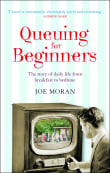The Presentation of Self in Everyday Life

Book description
One of the defining works of twentieth-century sociology: a revelatory analysis of how we present ourselves to others
'The self, then, as a performed character, is not an organic thing ... it is a dramatic effect'
How do we communicate who we are to other people? This landmark work by…
- Coming soon!
Why read it?
4 authors picked The Presentation of Self in Everyday Life as one of their favorite books. Why do they recommend it?

This path-breaking book presents a view of human communication as theater, where speakers choose their words to create desired impressions, and listeners try to interpret speech while guarding against manipulation and deceit.
Strategic interaction and interpretation are central to the argument. In effect, Goffman is examining dynamic games with incomplete information, decades below the formal language for such analyses was developed.
From Rajiv's list on human interactions and the complexity of social life.

Although Goffman’s book was originally published in 1956 it remains stunningly relevant and hugely important. If I were forced to recommend one piece of sociology to someone unfamiliar with the subject this would be it. Using drama as a metaphor for understanding everyday behaviour, Goffman illustrates how we present ourselves to others, how we communicate, use props, and have both ‘front stage’ (the bits people see) and ‘back stage’ (those places where we rehearse) in our lives. One often reads in blurbs that ‘this book will change the way you see the world’ – well, it happens to be true…
From Tim's list on the changing nature of our everyday lives.

Erving Goffman’s work on impression management had a huge influence on me, beginning in my student days when I started to become fascinated by everyday interactions. The deliberate (and often convoluted) process of trying to control the impressions others form of us is integral to our modern-day understanding of brands and the social meanings they hold.
From Michael's list on why we buy and what brands “mean”.
If you love The Presentation of Self in Everyday Life...

Being present in the world is “a potentially infinite cycle of concealment, discovery, false revelation, and rediscovery.” Goffman, a social anthropologist, wrote several books about social relationships, considering how we show ourselves in the office, in risky situations, in institutions, and in more intimate meetings. Is it possible to be present with another without in some way performing? Are we ever completely authentic? His answers to these questions are fascinating and disturbing.
From Sallie's list on the existential crisis of looking in a mirror.
If you love The Presentation of Self in Everyday Life...
Want books like The Presentation of Self in Everyday Life?
Our community of 12,000+ authors has personally recommended 100 books like The Presentation of Self in Everyday Life.





























